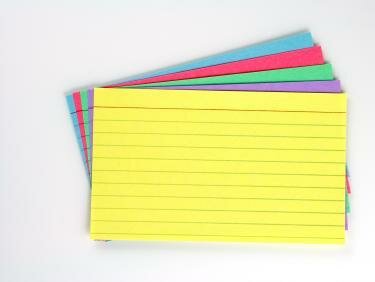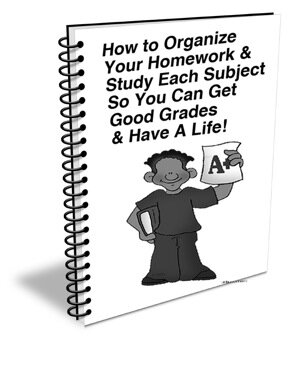Teach Your Kids
How to Study

Let's face it, most students don't know how to study. Everybody talks about the importance of grades and test scores, yet we neglect to show students how to do well!
It's a shame, really.
Our poor children either don't study at all or spend hours trying to studying every night. Neither choice is good. The whole thing ends up being a waste of time and effort.
Students might need to do some extra studying before a test, but there are ways to stay on top of the information without having to put in hours of hours of work or burning out.
Think quality more than quantity.
This is how I tell my own middle-school daughter and intermediate (3rd through 5th grade) students how to study and prepare for upcoming tests:
1. First of all, get organized. I recommend having a separate folder for each school subject. Keep things to be turned in (papers, reports, homework, etc.) on one side of the folder. On the other side, place all returned/ corrected homework, tests, handouts, etc. KEEP EVERYTHING- at least until the end of the semester! You will see why it is important to be able to put your hands on these papers...
2. A week or so before the test, ask the teacher for a study guide. (Do not become the annoying student that asks throughout every lecture, "Is this going to be on the test?" It drives the teacher bananas.)
3. If the teacher does not have a ready-made study guide, ask, "What should I know for the test?" Often, teachers will tell you exactly what you need to know and where to find it. WRITE DOWN WHATEVER THEY SAY!
4. For math tests: do the end-of-chapter problems or the sample test. If you can do these problems, you understand the most important concepts in the chapter, and you should do well on the test.
5. Also for math tests: re-do any homework problems you missed. Make certain that you understand where you went wrong the first time. Ask the teacher to explain any problems you still cannot do.
6. For social studies or science tests: answer the end of the chapter and/or unit questions. Often, you will find these exact questions on the unit test! At the very least, you will have a broad understanding of the most important concepts and ideas from the unit.
7. Review/ Organize/ Re-Write your notes. Take a look at your notes since the last test. Are they neat? Do they make sense? Is there a better way to organize them? For example, can you group certain ideas together? Would it make sense to have one page of dates and another page of important people? One of the best ways to get information into your head is to organize it and write it down. Re-write your notes neatly.
8. Review/ Organize/ Re-Write handouts from the teacher. If the teacher took the time to copy something, she thinks you need to know it. Take a look at all of the handouts the teacher gave you. Do you understand them? Please don't re-create all the handouts! Think about creating one page the most important information from them.
9. Know the definition of all vocabulary words, concepts, ideas, people etc. that have been introduced since the last test. These are the highlighted words found in a chapter. Sometimes, there will be a list of Important Words or People to Know. Write down all of these words and be sure to include any word that your teacher takes the time to define for you as well.
10. Memorize. You will be amazed at how much information you know after organizing your notes and looking for important words. Still, sometimes you must buckle down and commit things to memory.
How to Study with Flashcards

Here are two ways to make memorizing a blast:
Flash Cards. I love flash cards! Here's how to use flash cards to study:
Write the word on one side, the definition on the other and test yourself. For example, write electorate on one side of the flash card and the body of enfranchised citizens; those qualified to vote on the other.
Say, "electorate," and then flip the card over and say, "the body of enfranchised citizens; those qualified to vote." Do this over and over until you can repeat the definition without looking at it.
After you have learned all of the cards, start with the definitions and see if you remember the word before turning the flash card over. Speak up! Move around! You will learn faster if you hear the words out loud (auditory learning) and get your body involved (kinesthetic learning). Who cares if your little brother thinks you're crazy? He'll be jealous of your grades!
When you think you know all of the words and definitions, ask someone else to test you. Missed any? Go back and memorize them. Do this until you know every last word.
Read more about flash cards!
How to Study with Folded Paper
Folded Paper. I know, I am so high tech! I learned how to study with this study method in the 8th grade, and I have been using it ever since- even in graduate school.
Fold a regular piece of lined binder paper in half the long way (hot dog style). In the left column, write the words you need to memorize. In the right column, write down the definitions. Think of the paper as a bunch of attached flash cards. Keep the paper folded and flip it back and forth as you learn each word and definition. Follow the same routine as with the flash cards: memorize, test yourself, get tested.
Start this process a few days before the test. So, after you finish your regular homework, study for a half an hour or so. Don't wait until the last minute and try to cram everything into your head. Put a little information in each night, and it will stick. Plus, by studying this way, you will still have time for a life outside of homework, AND you will feel relaxed and confident about the test.
Finally, right before the test, review your notes (read them out loud if you can) and run through your flash cards or folded paper study sheets.
You are ready to ace the test!

Learning how to study is not difficult at all! And, the best part is that once you learn how to do it, you're set! I don't study much differently now than I did when I was in the 8th grade. (Studying is probably the only thing I still do the same way!)
So, if you are a parent trying to convince your child to learn these techniques or a student trying to teach yourself how to study- don't give up! Knowing how to study is actually a skill a person can use for the rest of their life!
Want More How to Study Help?
Check out the ebook:
How to Organize Your Homework and Study Each Subject So You Can Get Good Grades and Have A Life...










